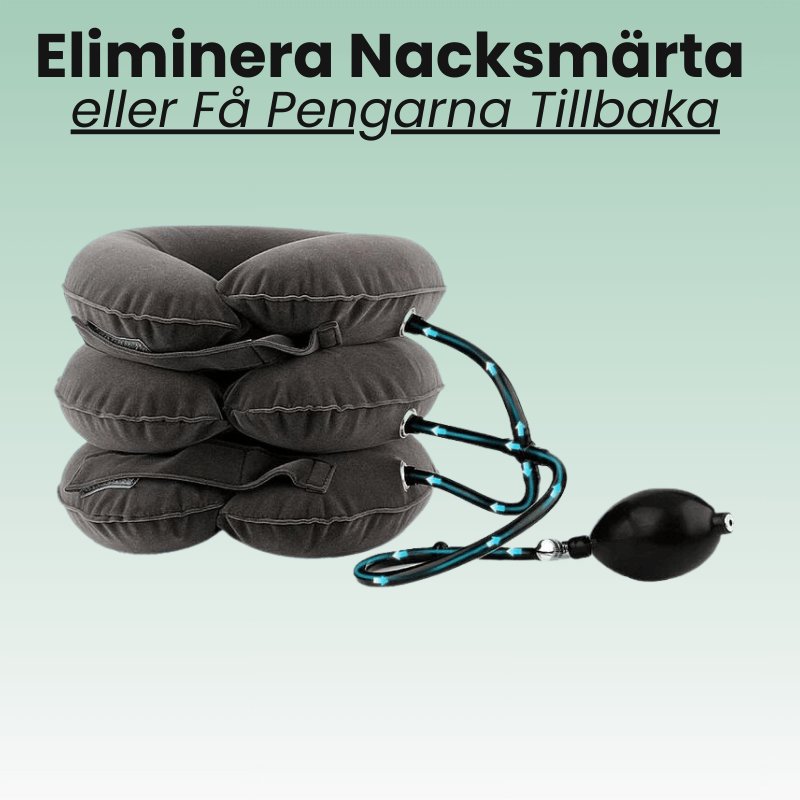Muscle Tension in the Neck: Symptoms, Causes, and Treatment

Neck muscle tension is a common problem that can cause discomfort and limited mobility. This article reviews the most common symptoms, causes, and treatment options for neck muscle tension.
What is muscle tension in the neck?
Neck tension means that the muscles in your neck are overworked and tense, causing pain and stiffness. The condition is often caused by stress, poor posture or overexertion. Rest, stretching and ergonomic adjustments can help relieve symptoms.
Symptoms of muscle tension in the neck
Common symptoms include:
- Stiffness and tension in the neck and shoulders
- Pain in the neck, often more pronounced on one side
- Headache, especially in the forehead or back of the head
- Limited mobility in the neck
- Feeling of fatigue in the neck and shoulders
- Tenderness when touching the neck muscles
Neck pain and muscle tension are very common complaints that affect many people. The pain can occur suddenly or develop gradually over time. For many, it starts with a slight stiffness that then develops into more noticeable pain. Headaches are often a secondary symptom that occurs when the muscles in the neck are tense for a long time.
Muscle tension can cause recurring problems that sometimes manifest as pain that radiates up to the head or down to the shoulders and back. In people with chronic muscle tension in the neck, symptoms can vary in intensity but rarely disappear completely without treatment.
Causes of muscle tension in the neck
Several factors can contribute to muscle tension in the neck:
- Stress and mental strain
- Poor posture, especially during prolonged screen work
- Overstrain of the neck muscles
- Incorrect sleeping position
- Vision problems leading to straining of the neck muscles
Stress is one of the most common causes of muscle tension in the neck. When we are stressed, we tend to tense our muscles automatically, often without being aware of it. Over time, this can lead to chronic tension and pain.
Poor posture, especially from prolonged use of a computer or smartphone, is another common cause. Holding your head in a forward-leaning position for extended periods of time puts strain on the muscles and joints of your neck, which can result in tension and pain.
Overuse of the neck muscles can also occur during repetitive movements or physically strenuous work. Sometimes, an incorrect sleeping position or an unsuitable pillow during the night can also contribute to neck problems when we wake up.
Diagnosis and treatment of muscle tension in the neck
Muscle tension in the neck is a common problem that is often caused by stress, poor posture, or prolonged sedentary work. The condition can cause headaches, stiffness, and pain that radiates down to the shoulders and back.
A thorough diagnosis and proper treatment can help relieve the discomfort and restore mobility.
Stretching and exercises
Regular neck exercises increase mobility, improve circulation, and reduce muscle tension.
Advantages of NackKomforten™: Provides support during exercises and helps the neck maintain proper posture.
Heat and cold therapy
Heat softens tense muscles, while cold can relieve inflammation and pain after overexertion.
Advantage of Termoreliever™: Offers both heat and cold therapy for flexible relief.
Massage and manual therapy
Massage and physical therapy can release deep muscle tension and improve blood circulation.
Advantage of NackKomforten™ and Termoreliever™: Can be combined for better effect and faster recovery.
Posture correction
A straight and relaxed posture reduces strain on the neck muscles and prevents future tension.
Advantage of NackKomforten™: Helps support correct posture during work and rest.
Important to remember
To effectively treat muscle tension in the neck, it is important to identify the underlying cause.
For long-term or recurring problems, you should make an appointment with a physical therapist for a personal assessment.
Small adjustments to your working position, regular breaks, and simple neck movements throughout the day can make a big difference in reducing tension and stiffness.

How Neck Comfort™ and Termoreliever™ can help with muscle tension in the neck
Neck Comfort™ and Termoreliever™ offer several benefits for people with muscle tension in the neck:
- Neck Comfort™ provides support and improves posture
- Termoreliever™ offers both heat and cold therapy for pain relief
- The combination can help reduce muscle tension and increase mobility
- The products can be used both during activity and rest for continuous support
- Contributes to faster recovery and reduced risk of recurring problems
The Neck Comfort™ is designed to provide optimal support for the muscles and structure of the neck. With regular use, it can help maintain better posture, reducing strain on the muscles in the neck and shoulders. This is especially beneficial for people who spend a lot of time in front of the computer or doing other activities that put strain on the neck.
Termoreliever™ offers both heat and cold therapy, providing flexibility depending on the type of condition. Heat therapy can be used to relax tense muscles, while cold therapy is effective in reducing inflammation and pain in acute conditions.
Conclusion
Neck muscle tension is a common problem that can often be relieved with the right treatment and support. By combining self-care, appropriate exercises, and the use of supportive devices such as the Neck Comfort™ and Termoreliever™, many people can effectively manage their symptoms and improve neck function. It is important to pay attention to your body's signals and seek professional help if symptoms persist or worsen.
With the right information and tools, most people can manage and prevent neck muscle tension. By identifying and addressing the underlying causes, such as stress or poor posture, and supplementing with appropriate aids, you can often see significant improvement in the symptoms and prevent them from becoming chronic.
Frequently Asked Questions (FAQ)
How long do muscle tension in the neck usually last?
With the right treatment, many people can experience improvement within a few days to a couple of weeks.
Can stress cause muscle tension in the neck?
Yes, stress is a common cause of muscle tension in the neck and can worsen existing problems.
How do I use Termoreliever™ for muscle tension in the neck?
Use heat therapy to increase blood circulation and reduce tension, or cold therapy to reduce inflammation in acute conditions.
Can Neck Comfort™ help prevent muscle tension in the neck?
Yes, by supporting correct posture, Neck Comfort™ can help prevent overload and tension in the neck.
When should I seek medical attention for muscle tension in my neck?
Seek medical attention if the tension is persistent, worsens over time, or if you experience other symptoms such as numbness or weakness in your arms.

